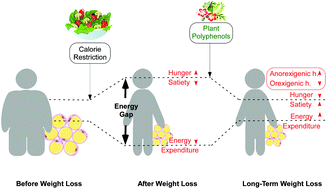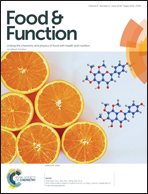Hibiscus and lemon verbena polyphenols modulate appetite-related biomarkers in overweight subjects: a randomized controlled trial
Abstract
Trial design: Plant-derived polyphenols have shown potential to alleviate obesity-related pathologies by a multi-targeted mechanism in animal models and human intervention studies. A dietary supplement based on a combination of Lippia citriodora (LC) and Hibiscus sabdariffa (HS) polyphenolic extracts was assayed in a double blind and placebo-controlled intervention study with 54 overweight subjects. Methods: Blood pressure, body weight, height, triceps, biceps and abdominal skinfold thickness, and arm and abdominal circumferences were taken at the baseline, 30 and 60 days of the intervention period. The validated Visual Analogue Scale used to record hunger and satiety-related sensations was passed at the beginning and at 15, 30, 45 and 60 days of the intervention. Subjective health status was assessed through the validated SF-36 questionnaire at the beginning and end of the study. Finally, plasma from fasting blood samples was obtained at the beginning, 30 and 60 days of the study. Results: The results showed an improvement of anthropometric measurements, decreased blood pressure and heart rate and a more positive perception in the overall health status. We also observed that plant polyphenols increased anorexigenic hormones (glucagon-like peptide-1) and decreased orexigenic hormones (ghrelin). Conclusions: Based on previous evidence we postulate that AMP-activated protein kinase may have a role in such effects through its capability to modulate energy homeostasis, total daily energy expenditure and lipid management. Although further research may be required, we propose that this polyphenolic combination may be used for weight management by increasing long-term weight loss maintenance through the modulation of appetite biomarkers. This may help to avoid the undesired weight regain typical of calorie restriction diets.



 Please wait while we load your content...
Please wait while we load your content...